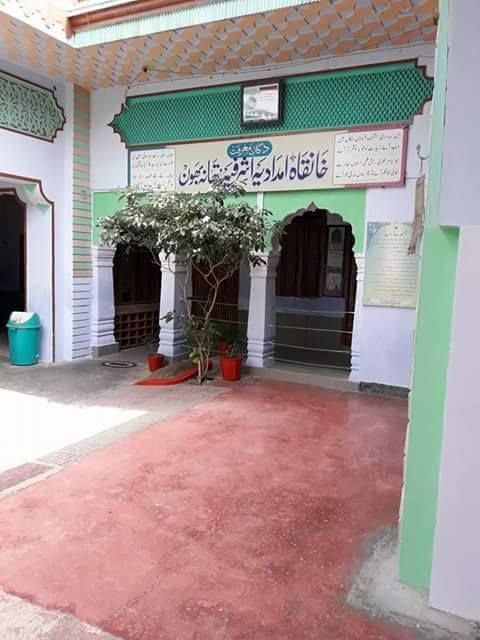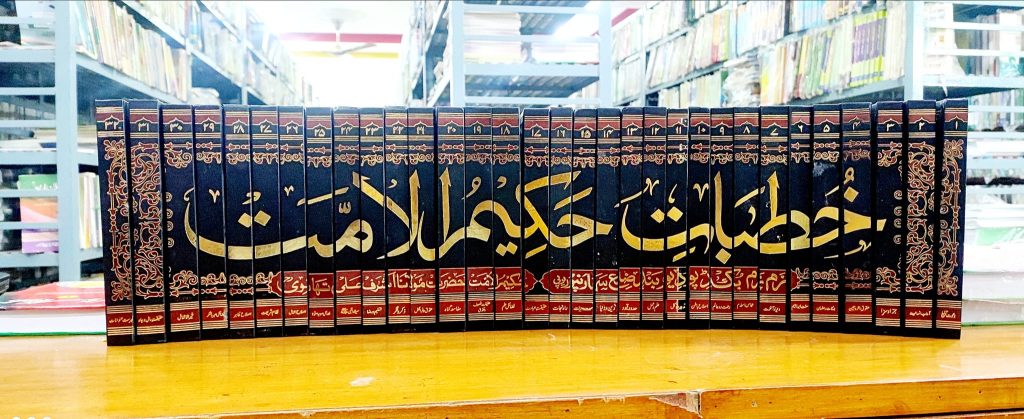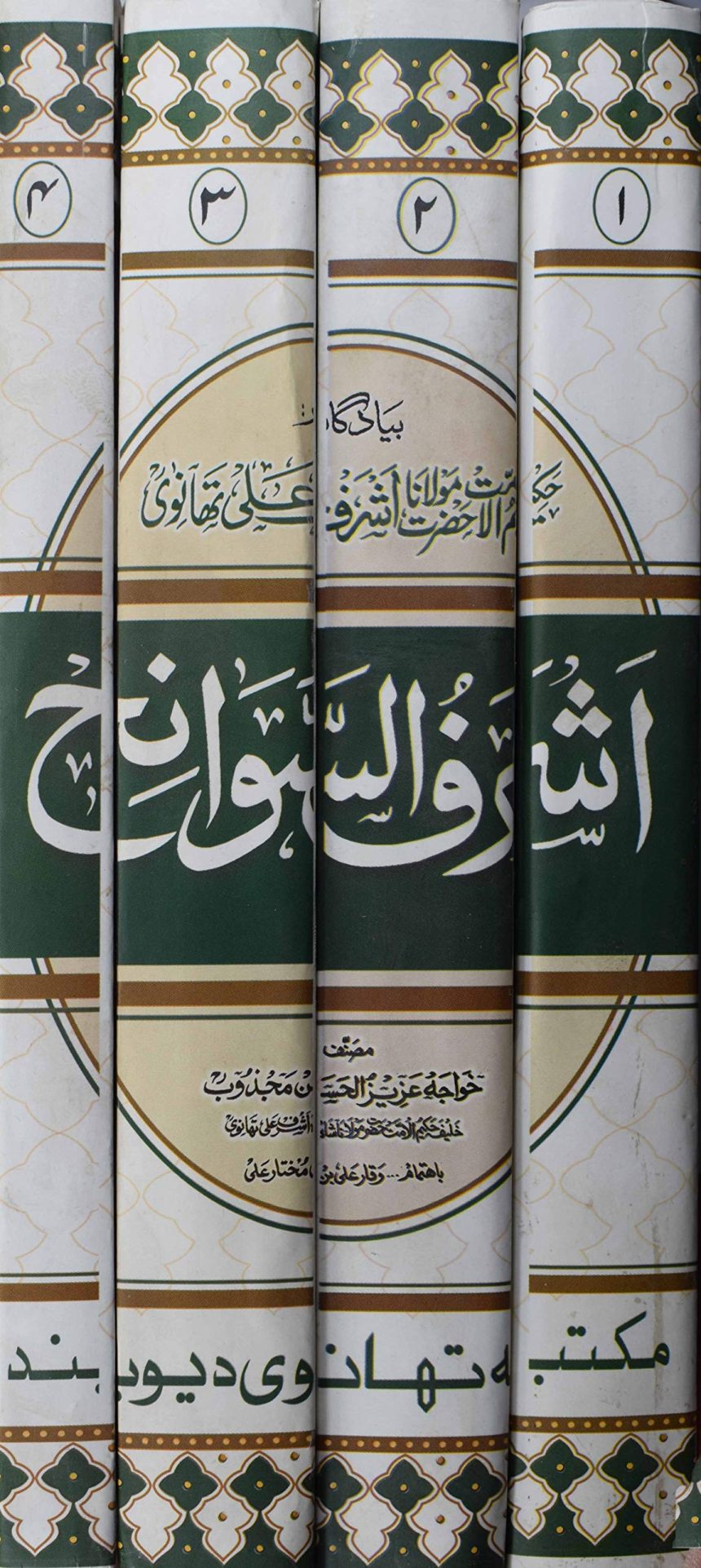This article summarises the life of the illustrious giant of Deoband, Shaykh Ashraf Ali Thanwi. It is neither comprehensive nor can justice be served to his contributions in one single webpage. Nonetheless, we hope to provide a glimpse of his life to the student of knowledge, as a foundation for which they can be inspired to research the life and works of Hadhrat Thanwi in depth.
Birth and Upbringing
Hakīm al-Ummah Maulānā Ashraf Alī bin Abdul Haq Thānwī was born in the village Thānā Bhāwan, in India. He was born on the 5th of Rabi’ al-Thānī 1280 AH. (which corresponds with approx. Saturday 19th September 1863 C.E.)
Sadly, Maulānā Ashraf Alī Thānwī lost his mother at a very tender age and, as the sole guardian- his father exerted immense efforts in the upbringing of both him and his younger brother, nurturing them with discipline and good character.
Piety in Youth
From a young age Hakeem Al-Ummah r.h. displayed eagerness towards Islām and was very particular about his salāh. It is noted that at the age of just 12, he began to pray Tahajjud salāh with consistency. It is famously known that as a youngster, upon passing by a masjid, he would ascend the pulpit, perform a short khutbah (speech) and then carry on his errand! Whilst with his friends, they observed that he would arrange their shoes to resemble people praying Salāh in Jamā’ah!
Without a doubt, when Allah swt chooses a servant of his to be close to him, this innate attraction to the deen is a given.
Studies – Deoband
Out of his many teachers, one was his uncle Maulānā Fateh Muhammed Sāheb who taught him elementary Islamic books. Thereafter he proceeded to study formally at Dār al-Ulūm Deoband where he completed his studies at the age of 20.
During his student days, Hakīm al-Ummah would never waste his time in frivolity and amusement. Whilst enrolled at Deoband. His sole endeavor was to seek knowledge. If his teachers were occupied doing Wūdhū (during class time), he would resort to reading external reference books (khārji mutāl’ah) to make the most out of his time.
We must be appreciative of such sacrifices, efforts and hardships which Hakīm al-Ummah endured to make him the great exemplary that he was. It is said that he has authored more than a thousand books and there is not one field of Islām which he has not covered!
Spirituality

After graduating, Hakīm al-Ummah proceeded to Khānpur, where he spent 14 years teaching and authoring books.
Hakīm al-Ummah expressed his desire to establish a spiritual connection with Shaykh Maulānā Rashīd Ahmad Gangohī-: however, Shaykh Gangohi refused, stating that it would interfere with his studies. Therefore Hakīm Al-Ummah wrote a letter to inform Hājī Imdādullah in Makkah Mukarramah about this and Hājī Sāhib accepted him as his spiritual disciple.
After his stay in Khānpur, Hakīm Al-Ummah returned to his village Thānā Bhāwan and established his spiritual retreat (Khānqah) there. Many would travel to benefit from his company (suhbah) and his spiritual discourses which would prolong to five to seven hours!
Amongst the scholars of Deoband, he is predominantly known as a specialist in the field of spirituality and Tasawwuf. His title ‘Hakīm al-Ummah’ translates to, ‘The (Spiritual) Physician of the Nation (Ummah)’, and his legacy attests to him deserving that title.
Once Hakīm al-Ummah was asked “Since you have written more than 1000 books, you must have read many books for research, (how many have you read)?” Hakīm Al-Ummah replied “I have not read many books, 3 books sufficed me from all the rest, and they were: Shaykh Hājī Imdādullāh Muhājir Makkī Sāhib, Shaykh Maulānā Ya’qūb Sāhib and Shaykh Maulānā Rashīd Ahmad Gangohī Sāhib.”
Such a great, esteemed personality and such a humble reply! Many lessons can be taken from this one reply. We can learn that despite the titles and status lauded upon us, never forget your roots. Our respected teacher would often advise us by saying “Regardless of how high up the ladder you climb, remember that you had to climb the bottom steps to get to the top.”
Knowledge is not only gained by means of studying and teaching, but rather it is also gained by staying in the company of the pious and serving them. Whoever wishes that Allāh ﷻ accepts them for his work, should sit in the company of his (Allāh’s) friends.
Books

Hadhrat Maulana Ashraf Ali Thanwi was the author of many books. Below are a handful of titles which are the most well known of his collection. It is also important to note that after his demise, many books were authored in his name which were either, spiritual discourses converted into book format, common topics/stories compiled in a single book taken from his previous writings and similarly other teachings which were attributed to him.
1.Bayān al-Qurān 2. Behishti Zewar 3. Al-Heela al-Nājizah
4. ādāb al-Muā’sharāt 5. Al-Takasshuf 6.Al-Tasarruf
7. Aghlāt al-Awām 8. Imdād al-Ahkām 9. Nashr al-Teeb
10. Al-Tasharruf 11. Kaleed E Mathnawi 12. Al-Intibāhāt al-Mufeedah 13. Ashraf al-Jawāb
Aside from these few, there are many voluminous books published that are a compilation of the teachings and spiritual discourses of Hadhrat Thanwi, such as, Khutbāt Hakīm al-Ummah, Jawāhirāt Hakīm al-Ummah, Mawā’iz Ashrafiyyah and so on.
Demise
Hadhrat Hakīm al-Ummah spent his life serving Islām. At 79 years of age, Hakīm al-Ummah bid farewell to this temporary abode on the 16th of Rajab 1362 A.H. (Which corresponds with the 19th of July 1943). Hadhrat Maulānā Zafar Ahmed Uthmāni led his Janāzah (funeral) prayer and he was laid to rest in Thānā Bhāwan in the Ishq Bāzān Graveyard.
His full biography can be found in Urdu titled ‘Ashrafus Sawānih’
May Allāh overlook any shortcomings of mine and elevate the ranks of Hadhrat Hakim al-Ummah.
Ml Hanzala Khan


Leave a Reply